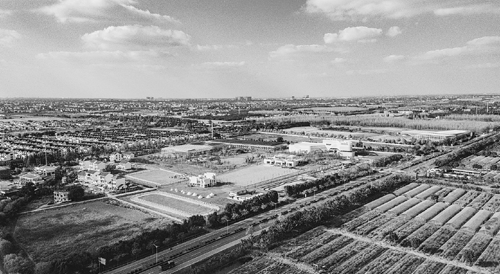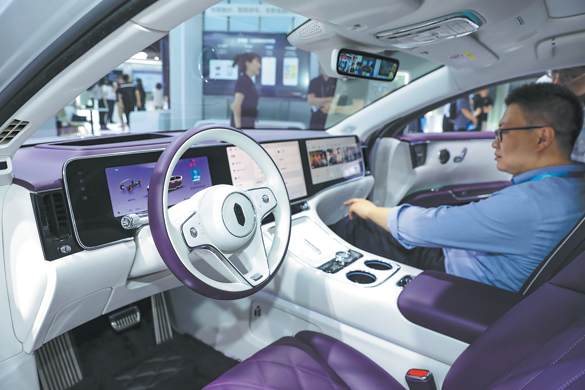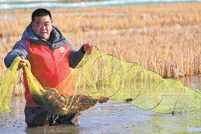Harvesting the future
Smart technology and temperature-control systems resemble a space-age approach to agriculture, Yang Feiyue reports.

Smart farming is making its presence felt and is bringing in positive results in an eastern Chinese city.
You could be forgiven for thinking that the space age has dawned on agriculture. Visitors to a vegetable cultivation greenhouse at the Xiangjiadang agriculture digitalization plant that opened in Jiaxing, East China's Zhejiang province, in June have to undergo strict entrance procedures. These involve a strong jet of air washing over visitors from head to toe in a sealed room.
"This is to get rid of any possible hazards that could undermine the growth of produce here," says Geng Weibin, an official with the plant.
Green vines spread along elevated racks and dark green cucumbers were ready for picking in mid September.
"All it takes is 28 days from the moment we plant the seedling," Geng says.
The cucumber greenhouse covers an area of 6,000 square meters and can produce more than 60 kilograms of cucumber per square meter every year, he adds.
In addition to cucumbers, the facility in the city's Nanhu district has tomatoes, cherry tomatoes and bell peppers.
It involves an investment of 60 million yuan ($9.3 million) and takes up an area of 62 mu (4.13 hectares). The whole place offers smart agriculture and management through the internet of things, automatic sorting and packaging, food sourcing and e-commerce trading.
For example, a positive pressure air supply system has been installed.
It allows temperature and humidity adjustment in the greenhouses, so everything remains on an even keel, Geng explains.
The green room ceiling is made of diffuse reflective glass, which enables up to 97 percent of light transmittance, as opposed to 85 percent in traditional ways, and thus efficiently raises the photosynthesis effects.
Nutrition liquids are concocted and applied to the plants by an automated and smart farming system.
"The water and nutrition ratio has been optimally figured out and how much liquid each vegetable needs is precisely controlled by computer, based on real-time sunlight and the growth phase," Geng says.
The Xiangjiadang agriculture digitalization plant is expected to provide 1 million kilograms of premium green vegetables and offer job opportunities to about 500 local farmers, according to the local authority.
"We can offer 58,000 yuan a mu to the government over the next 12 years," Geng says, adding that local farmers can get land rental and income from working here.
Zhao Xuebao, 68, is happy that she can get paid 130 yuan a day doing something that is much easier than what she did before.
"The region used to be occupied by traditional farming at the beginning," she says.
Zhao used to grow paddy rice in the old times and could produce about 300 kilograms a year.
After receiving training about standard pruning, vine arrangement and use of rail cars for greenhouses, Zhao has been able to live up to her responsibilities.
"It's much easier work here, the environment is so much nicer, and the pay is better," she adds.
It is only a 10-minute motorcycle ride from her home.
Local authorities aim for those digital farming projects to be a model in the transition from traditional to modern farming.
The goal is to pursue highly productive and efficient agriculture in the future.
One-hour drive away, Zeshan Aslam is getting ready to work at the molecular diagnosis laboratory at an ecological garden in the city's Pinghu district.
The garden was built by the Orisis Group in 2018, which specializes in plant-seedling technology and detoxification systems.
Aslam came from Pakistan and visited China to pursue his PhD in horticulture in 2013. He was drawn to the place after finding it ideal to apply what he has learned.
"I want to get more experience, learn and enhance the competency and expertise in this field here," he says.
The facility features a commercialized detoxification research center for multiple varieties of plants, an industrialization project of planting system for new berries and a high-standard seedling breeding base.
At the moment, a 200-mu land area has been used for seedling cultivation and culture and tourism in the west of the ecological garden.
Plants range from apple and hydrangea to blueberries and strawberries.
"We introduce (agricultural) species from abroad and then carry out new species research and development, as well as breeding and industrialization," says Ma Xinyuan, a senior officer with the garden.
The goal is to enrich the vegetable and fruit diversity, Ma says.
After the seedlings grow, they will be moved to the east, where a 600-mu land area is ready for their further development.
"When the molecular diagnosis lab goes into operation, we will have the whole industrial chain here," Ma says.
Seedlings could be directly sent here for improvement and nurturing, which will remove many uncertainties in quality control when they have to be transported from Orisis' operations in Wuxi.
To date, the garden has hired more than 30 local farmers.
"Most of them have their rights of the land transferred and get rental income," Ma says.
As for future development, more agriculture-related experience-based projects, including traditional culture and tourism experiences, will be developed, according to him.
About a 30-minute drive from the ecological garden, plant care robots and unmanned vehicles for vegetable transportation are running in good order at a fruit and vegetable plantation in the Pinghu agriculture economic development zone.
The site features a variety of new planting methods, including sand, water and aerosol culture. It covers an area of 120 mu and produces 500 tons of fruits and vegetables a year, with an annual output of 6 million yuan.
Supported by the Beidou navigation satellite system, a high-precision map of the farmland was derived, which paved the way for optimizing equipment and personnel management and standardizing unmanned farming operations, says Lin Baixiang, a technical worker at the facility.
With the precision of positioning reaching centimeter level, the unmanned fruit and vegetable transportation and automated sprinkling irrigation can be better controlled, Lin adds.
Speaking about marketing farm produce from the Xiangjiadang agriculture digitalization plant, Geng Weibin says he doesn't worry about sales at all.
"Since the plant is near Shanghai, we are sure the demand is exceeding the supply at the moment, especially during the Mid-Autumn festival," he says.
Moreover, farming culture and tourism experiences will be provided soon at the digital plant.
"People would be able to pick up vegetables and children can get in touch with the farming work here," Geng says.



Today's Top News
- China to apply lower import tariff rates to unleash market potential
- China proves to be active and reliable mediator
- Three-party talks help to restore peace
- Huangyan coral reefs healthy, says report
- PLA conducts major drill near Taiwan
- Washington should realize its interference in Taiwan question is a recipe it won't want to eat: China Daily editorial






























